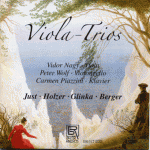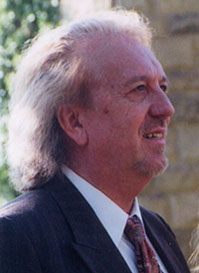 JUST Trio in E flat major op. 13. Nr. 4
JUST Trio in E flat major op. 13. Nr. 4
HOLZER Trio in C major op. 7. Nr. 3
GLINKA Trio pathétique in D minor
BERGER Trio in G minor op. 94
Vidor Nagy (viola) Peter Wolf (celIo) Carmen Piazzini (piano)
Bayer Records BR 100 317 CD (www.bayermusicgroup.de)
If, like me, you thought that trios for viola, cello and piano must be really thin on the ground, maybe we should revise that opinion. Two years after the release of a CD with trios by Beethoven, Brahms and Zemlinsky (see The Strad, March 2006), along comes the indefatigable Vidor Nagy with a second helping. Johan August Just’s composition was published in 1782 „fort he Harpsichord or Piano Forte with Accompanyments“, and the sting parts are accordingly modest. Johann Baptist Holzer (a member of the same Freemason lodge as Mozart, and author of the present Austrian national anthem) wrote more ambitious parts for the three players. Since the viola stays in first position and is linked in thirds with the cello most of the time, the piece has an agreeably dark colour in spite of its C major key.
Ginka’s Trio pathétique, an early composition, was posthumously published in versions for both clarinet and violin. Since typical woodwind figurations are conspicuous by their absence, a viola version doesn’t seem that far-fetched. The same reasoning, eloquently defended in Ulrich Drüner’s typically well-informed booklet notes, was applied to Wilhelm Berger’s Brahmsian trio from 1905. Whatever the theory, it has to be said that both these compositions sound convincingly compelling, at least in the fiery advocacy of Nagy and his colleagues. Peter Wolf, principal cellist of the Hessian Radio Orchestra in Frankfurt, is new to the team, and fits in perfectly. The three players appropriately rein in their temperament for the Classical pieces, the more to let go when ist comes to the Romantic part of the programme. The recording is warm and yet clear, presenting this fascinating programme in the best light.
Carlos Maria Solare
Übersetzung:
 VIOLA TRIOS
VIOLA TRIOS
mit Werken von
JUST, HOLZER
GLINKA, BERGER
Ausführende: Vidor Nagy (Viola), Peter Wolf (Cello), Carmen Piazzini (Klavier) Bayer Records BR 100 317 CD (www.bayermusicgroup.de)
Wenn Sie so wie ich gedacht haben, dass Trios für Viola, Cello und Klavier dünn gesät sind, dann sollten wir diese Ansicht womöglich noch einmal überdenken. Zwei Jahre, nachdem eine CD mit Trios von Beethoven, Brahms und Zemlinsky herausgekommen ist (siehe The Strad März 2006), kommt jetzt der unermüdliche Vidor Nagy mit einer zweiten Portion. Johan August Justs Komposition wurde 1782 „für das Cembalo oder Pianoforte mit begleitenden Instrumenten“ herausgegeben, die Streicherparts sind entsprechend bescheiden. Johann Baptist Holzer (Mitglied derselben Freimaurerloge wie Mozart und Komponist der jetzigen österreichischen Nationalhymne) schrieb anspruchsvollere Stimmen für die drei Spieler. Weil die Viola an erster Stelle bleibt und die meiste Zeit in Terzen mit der Cellostimme geführt ist, hat das Stück eine angenehm dunkle Farbe trotz der Tonart C-Dur.
Glinkas „Trio pathétique“, ein Frühwerk, wurde posthum in Ausgaben für Klarinette und Violine veröffentlicht. Weil typische Holzbläserfiguren auffälligerweise fehlen, scheint eine Fassung für Viola nicht so weit hergeholt. Die gleiche Art der Begründung wurde. Wortgewandt vertreten in Ulrich Drüners für ihn typisch gut recherchiertem Booklet-Text, auf Wilhelm Bergers Brahmsisches Trio aus dem Jahre 1905 herangezogen. Trotz all dieser Theorien muss man einfach sagen, dass diese beiden Komponisten zwingende Überzeugungskraft haben, zumindest in der feurigen Fürsprache von Nagy und seinen Kollegen. Peter Wolf, der erste Cellist des Hessischen Radiosinfonieorchesters in Frankfurt ist neu im Team und passt perfekt dazu. Die drei Instrumentalisten zügeln passenderweise ihr Temperament bei den klassischen Stücken, lassen ihm aber umso mehr freien Lauf im romantischen Teil des Programms. Der Ton der Aufnahme ist warm und trotzdem klar und deutlich und zeigt dieses faszinierende Programm im besten Licht.
Carlos Maria Solare
